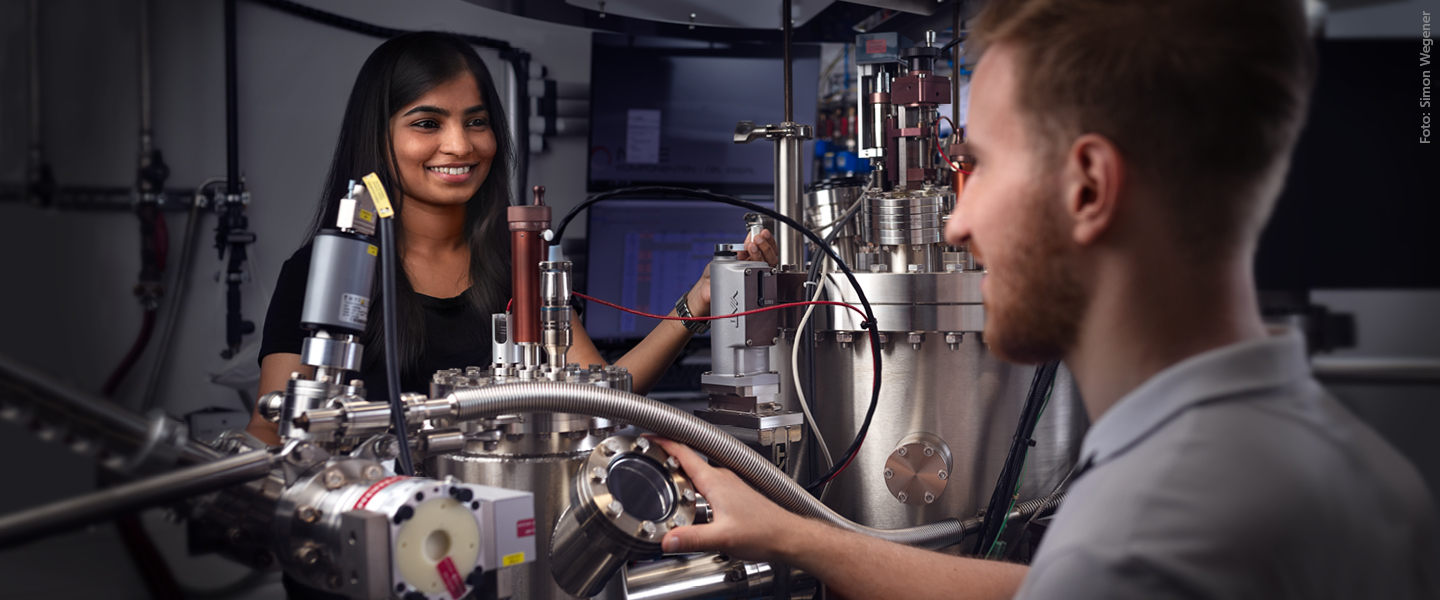EIN Quantum NRW
North Rhine-Westphalia joins forces to establish a hub for quantum science and technologies
Education, Innovation, Networking in quantum science and technology – these are the goals of the new quantum computing network “EIN Quantum NRW”, which bundles the expertise of universities, non-university institutions as well as industrial partners in North Rhine-Westphalia. Minister President Hendrik Wüst, Minister of Science Isabel Pfeiffer-Poensgen and Minister of Economics Prof. Dr. Andreas Pinkwart announced the establishment of the state’s hub for quantum science and technology in a press conference today.
“We are proud that North Rhine-Westphalia is a European hotspot for quantum computing,” said Minister President Hendrik Wüst.
More than a dozen research institutions have launched the network to join forces with companies from industry. EIN Quantum NRW will receive up to 20 million euros over an initial funding period of five years. The special feature is that the research institutions themselves are contributing 7.5 million euros in anticipation of added value through cooperation with industry – a strong commitment to NRW as a location for research and development. The state government is flanking this contribution with up to 12.5 million euros until 2026.
Minister President Hendrik Wüst: “Quantum computing is a global innovation. The new competence network links science with the great economic power in our state. No other region in Germany has such extensive expertise, infrastructure and networking as North Rhine-Westphalia. We are proud that our state has become a European hotspot for quantum computing. The state government will further expand this strong position as part of its Digital Strategy 2.0 and thus further promote the strategic networking of science and industry.”
“The state government’s support comes at the right time, because regional ecosystems of quantum technology are currently being established throughout Germany and Europe,” stresses Prof. Tommaso Calarco, director of the Institute for Quantum Control at Forschungszentrum Jülich. “The extraordinarily high density of quantum expertise in science and industry in our state can multiply its impact through this bundling.”
Quantum technologies will change our everyday lives. Numerous technical achievements in recent years can be traced back to findings in quantum physics. Examples range from photovoltaic cells to laser and medical technology – such as magnetic resonance imaging – to modern computers and the Internet. The progressive control of individual quantum particles is increasingly bringing other technological capabilities within reach that were long thought impossible. Quantum technologies are expected to help provide new answers to major questions and challenges of our time, such as the complex interrelationships of climate change, better traffic flows, or tap-proof communication through quantum encryption, for example to reduce risks to critical infrastructures from cyber attacks.
“North Rhine-Westphalia is the engine for the development of quantum computing in Germany. The density of universities and non-university research institutions conducting research on quantum technologies is unique in Germany. According to the assessment of the Federal Government’s Expert Council on Quantum Computing, it is currently not yet possible to foresee which technology platforms for quantum computing will take the lead. It is a national unique selling point of North Rhine-Westphalia to cover the most promising approaches – superconducting circuits, ion traps, photons or semiconductor-based approaches – at its research institutions in terms of breadth and excellence and to promote concrete applications via transfer interfaces to industry,” says Science Minister Isabel Pfeiffer-Poensgen.
The network’s founding partners come from all over NRW. They include the universities of Aachen, Bochum, Bonn, Dortmund, Duisburg-Essen, Düsseldorf, Cologne, Münster, Paderborn, Siegen as well as the German Aerospace Center (DLR), the Forschungszentrum Jülich and the Fraunhofer-Gesellschaft.
Bridging research and industry
“North Rhine-Westphalia is predestined to play a pioneering role in the realization and application of quantum computing and other quantum technology fields, such as quantum cryptography. In North Rhine-Westphalia, numerous companies have an enormous interest in exploiting the opportunities offered by quantum technologies. They not only encounter outstanding scientific know-how, but also other companies and start-ups that are ready to implement the new technologies in industry as suppliers. To this end, we have set up the NRW coordination office QT.NRW,” says Prof. Dr. Andreas Pinkwart, Minister for Economic Affairs, Innovation, Digitalization and Energy of the State of North Rhine-Westphalia.
Potential users of the new technologies range from large companies to specialized start-ups, which will be involved in EIN Quantum NRW as partners from industry. One of the central tasks of EIN Quantum NRW will be to improve the networking of excellent basic research with large companies and quantum spin-offs in the state. The market potential is huge. As the largest chemical, energy and steel region in Europe, NRW has unique prerequisites with its strong textile and clothing as well as mechanical and electrical engineering industries and the most dense transport network. In particular, leap innovations with high economic relevance are expected in the field of medical drug development and material design, route optimization and traffic control as well as intelligent power grid management.
Interdisciplinary research and education
The partners of EIN Quantum NRW will increase their commitment to teaching, but also to the further training of young scientists and experts. After all, investments in quantum technologies can only be successfully implemented if appropriately qualified experts are trained. This requires expertise in physics as well as in computer science and engineering. At various locations, the departments are therefore increasingly working closely together within the network to develop appropriate offerings. In the Rhineland region, various programs for bachelor’s and master’s students as well as doctoral students at the universities of Cologne, Bonn and Aachen are already bundled in the ML4Q Research School. In Siegen, the master’s program Quantum Science will start in 2023, offering young scientists an interdisciplinary study program from the fields of physics, mathematics, computer science and electrical engineering.

(c) Simon Wegener
Related news